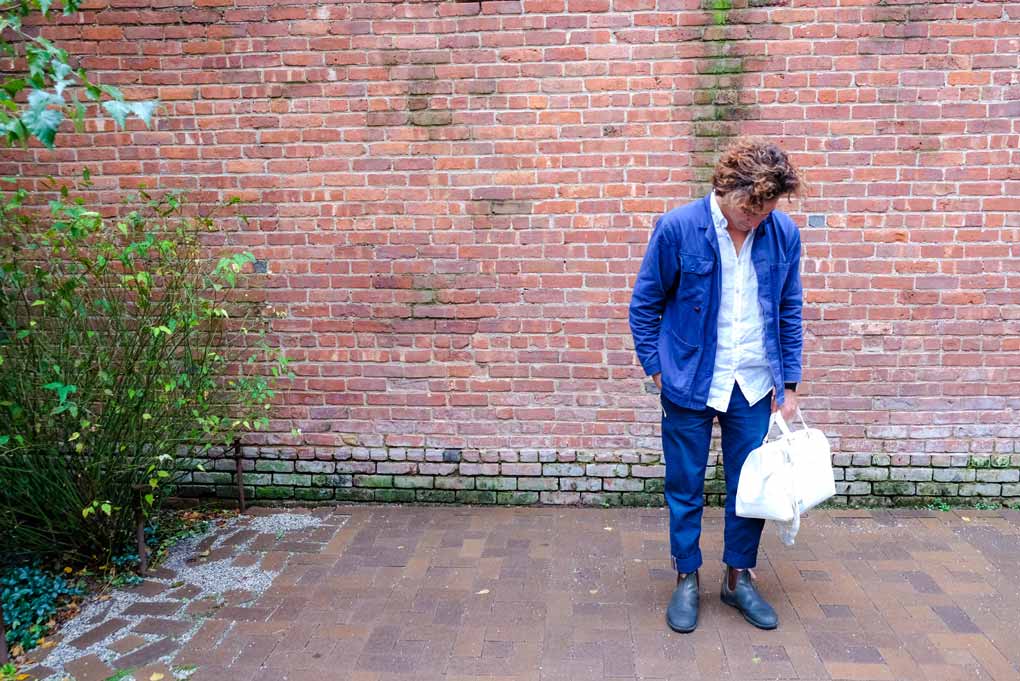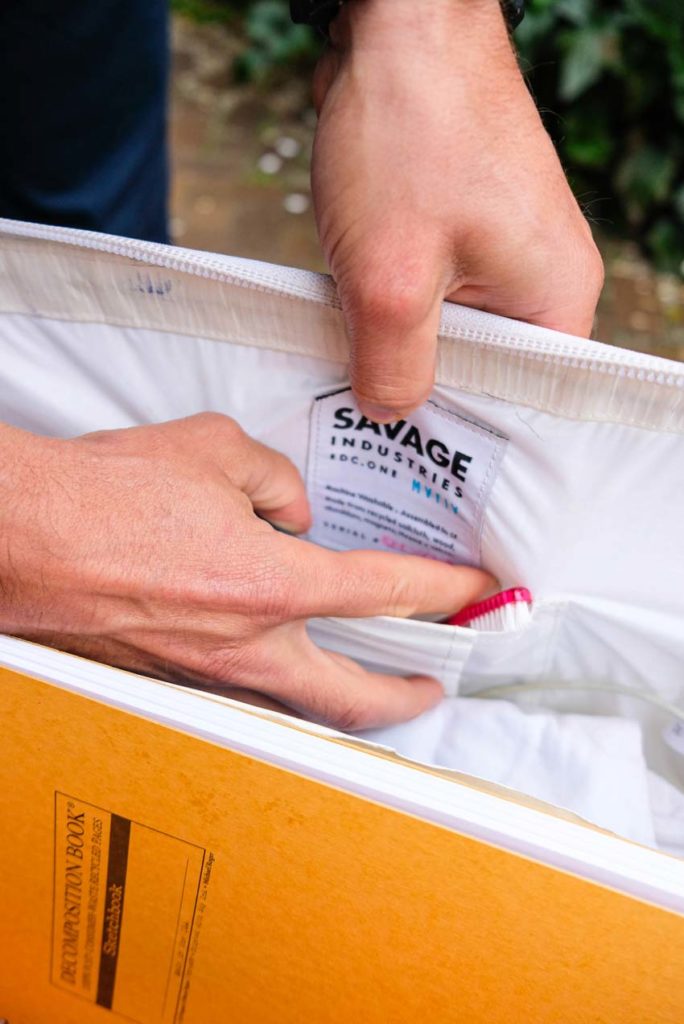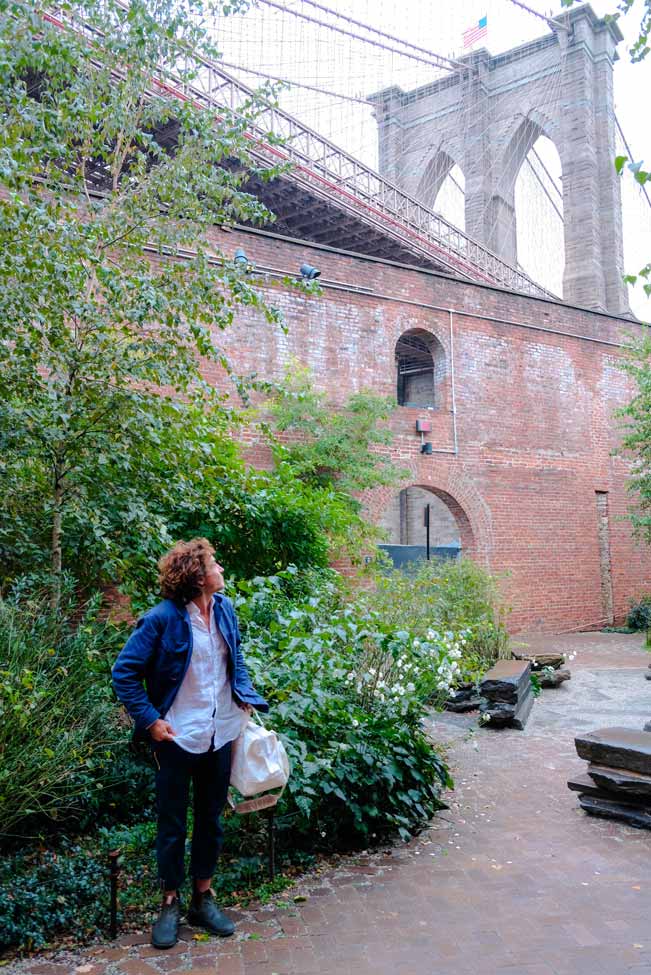Marcos Mafia was a Reef-sponsored, pro-kitesurfer. But as his skills grew so did his pile of retired sails. Unwilling to toss the otherwise sturdy sail fabric, he upcycled them into backpacks. After selling out his first run, Marcos and his sister Paz launched Mafia, a product-driven company focused on quality, upcycled materials.
With a presence in Japan, the United States and collaborations with Yves Behar, Patagonia and Adam Savage (to name a few) – here’s how he got started, his thoughts on sustainability and the impact he wants to create.

When did you launch and what got you going?
Marcos Mafia: We launched in 2012 in Buenos Aires. Actually, the whole thing with upcycling sails came in a natural way. Half of my room was covered with old sails and my mother was like, “Marcos I’m going to throw all your sails away because this is a mess.” And I was like, “Don’t do it. Just give me a few days and I’ll find a solution.”
At that time I was working at a wetsuit factory, so I had some idea of stitching, patterns and other things that were a great base for making a product. So I got together with a bunch of friends. They were designers, product makers and creative people and we came up with a product to make from upcycled sails.
There was this shop opening in Buenos Aires at the same time, so we sold our products at the shop opening, and the first night we sold all the bags! And I was like, fuck, we’re selling them too cheap or something.
I love that. How long does a sail for kitesurfing last before you retire it?
Marcos Mafia: Usually they will last for about two years, on average. Even though they might look great from a visual standpoint, they might be stretched and have little details that make them unable to fly as they should.
Whoa, that’s quick, no wonder your room was packed. How do you determine the styles and color patterns from your inventory?
Marcos Mafia: The process is always evolving. We’re lucky enough to work with really creative and inspiring people, so we learn more with each project. Like working with Tom Sachs we made these all-white packs with a red handle and grey webbing. He has a different approach to color and how things combine and work together – it gave us ideas for other stuff we were creating. So I think every single product we develop and launch helps to inform the color, branding and development.
There’s something nice about the process, we have very limited colors to choose from. It’s not this huge palette of colors. We have a lot of white since most sails are white, and then there’s bits of color here and there. So we play with it, and use upcycled sails to make a great, solid product that can compete with any other product out there, not just the ones that use recycled materials.

Looking back on all your collabs and creations, what sticks out about your journey?
Marcos Mafia: When we first started Mafia we were making products out of upcycled sails, and now we’ve discovered that there’s a whole new world for upcycled materials, not just sails. There are climbing ropes, fishing waders and wetsuits. There’s a lot of stuff that come into our hands, and we figure that with great design we can create something valuable and put them back into the market.
Are we talking beyond backpacks?
Marcos Mafia: Definitely beyond backpacks. They are just an example of what can be made, but the sky’s the limit. We can use our creative process to make longer lasting items from quality upcycled materials. I think there’s something about the world that is shouting for a change. And there needs to be products that respond.

Agreed. In terms of collaborations, what was it like creating with Adam Savage?
Marcos Mafia: Adam is friends with Tom Sachs, he brought us together. Adam came to the studio and had a few things he wanted us to do. So we made a few things for his own personal use. Adam Savage is a wonderful guy to work with. Very open and great collaborator. And he had this idea where he wanted to do a tool bag. We discussed it a few times, then one day I sat down and started working on it, and was inspired by the classic doctors bag. And when you see a product that works, there’s definitely a spark. I was like fuck, this is good. And when Adam saw it, he said that this is something we need to launch. He definitely changed some details, added a shoulder strap to it, functional add-ons, and we brought it to market and sold several thousand of them.
One thing people commented on was the price, and noted that it was a bit high. So we decided to open the plans and made a kit for people to make the toolbag themselves for less money. We made a video to help that has over 700,000 views. It’s a fun way to encourage people to get involved in the process and learn how things work. I feel like helps people get a better sense of the effort that goes into making something. We offer two kinds, if someone is outside the US, like in Europe they can just purchase our PDF and then buy their materials locally.
As a brand that puts so much care and thought into your products and relationships, what’s your approach to growth?
Marcos Mafia: Our work is very organic. I mean we have to sell products and make projects happen, but we work with people that want to carry our bags everyday, you know? When it came to expanding into Tokyo, we found partners that wanted to carry our brand there. It’s a partnership. For me growth…I don’t want to grow too much. It would be scary just to say let’s make 5X the amount of sales month over month. Some people love to do that, I’d rather just work very organically and have a very solid team of people working with us. I also want the freedom to be able to surf in the morning and feel peaceful.
I feel that sometimes when you grow too fast there are more moving parts that make things harder to control, and it’s difficult to grow smoothly. When it comes to developing product, like you mentioned with color development, not focusing solely on growth allows us to really develop our product.
I would much rather take this path rather than have crazy investment or sales goals. Maybe because I don’t know how to do that type of company, but for me it’s more healthy.

Totally, you create space to explore opportunities.
Yea and learn a lot and grow. For us, we learn the most when we partner up and collaborate with others. And if we aren’t in a rush to grow then we can take the time to explore. Many times if you looked at our process from an objective financial standpoint, it doesn’t make sense in the short term. At the beginning with Adam, we were just making products for him. They were probably way too expensive, we didn’t charge enough and they took a lot of energy. But Adam is a great guy and I wanted to make products for him. And we ended up making something really great together. I like the space to explore without the pressure.

So sustainability-wise, you upcycle sails, reuse cardboard shipping boxes and have a lifetime warranty. Anything else?
Marcos Mafia: We do local production. The products we sell to the US are made in California. The products we sell in Europe are made in Portugal, and in 2020 we will ship locally within Japan. Local production enables us to also fix our products locally.
I saw you were B-Corp certified, is that right?
Marcos Mafia:
The company from the very beginning was very aligned to the B-Corp way of thinking, so it was a very natural step for us to become a part of B-Corp. We have been a member for five years, but we recently decided not to renew our certification. We feel as though B-Corp is more focused on larger companies which, of course, is incredibly important work, since larger companies have an opportunity to make a big impact. We think the work of B-Corp is important, but we feel it no longer represents small companies like ours.
Our approach to doing things in a more sustainable way and supporting an ethical and transparent supply chain is still very much a part of what we do; this way of working is what our company was born out of, it’s in our DNA and nothing will change there. Of course, we want to share our sustainability efforts with our customers. A large part of our mission as a company is to encourage people to think differently about the materials and the products they use everyday, but we aren’t interested in selling sustainability. Sustainability is a no-brainer, it’s the right way to do things. At the end of the day, we want to make great product — it just so happens that up-cycling materials is also an awesome way to do just that.
I totally get that – there are a lot of companies that market sustainability but don’t create sustainably. Standards, certifications and seals of approval can help signal to consumers a certain level of authenticity. When you shop, what do you look for in a company?
Marcos Mafia: I like to be able to track the process of where something comes from. If I’m buying food, where does it come from and how does it get here? What are the steps? I look for transparent engagement into the production process. I tend not to buy from huge companies because I don’t think it helps us achieve a more balanced world. If I give my dollars into a massive big company, it allows more decisions to be made by a few, select group of people. And there’s beauty in buying from a small grocery store than buying on Amazon. I don’t even have an Amazon account. I’d rather just walk a bit and find a grocery store or coop. I think buying online gets us in the habit of buying things. It feels good for a minute. When you don’t do it, you kinda just forget that feeling.
So I think it’s important to track everything, but also to be able to buy great products, you know? Buy less, buy better. If you buy less, it can create more freedom, in a way. For me, there’s nothing nicer than going on a trip for two weeks with four good things.

What do you want to achieve with the brand?
Marcos Mafia: I want Mafia to represent a different way of making things and selling products. At the end of the day we are bringing all of our ideas to life and sharing our production process and sustainable products. And if we can invite other people to be part of it and take it as a good model, I think we have a great company.

That reminds me VEJA’s goal too. Sébastien Kopp and François-Ghislain Morillion describe their ambitions similarly.
Marcos Mafia: Totally, that’s when you can really start to create change and work with big companies and do a collaboration, or rethink an approach to materials – and not to just tell them for Earth Day let’s get consumers to buy more product.
How can we support Mafia?
Marcos Mafia: I think it goes beyond Mafia. Think of how to support this change and new world. We should buy less products, better products, and research where they are from. Understand this isn’t a way of sacrifice – it’s a way to live better.
I think that is a key thing missing from the mainstream sustainability movement. Sustainable products need to be well-designed functionally and aesthetically to compete, and to live a long, purposeful life. I don’t think that’s fully acknowledged yet.
Marcos Mafia: I agree with you. First and foremost, it needs to be a great product. You can’t really sell sustainability it’s how you do things. Like when a brand makes a really bad product just to give a portion of the proceeds to a cause. The whole conversation needs to be rethought.
I don’t want to be a hater, it’s great that people are starting to be more aware of things, and that’s the first step. But you’re not doing good for the earth if you buy a recycled jacket. You might be doing less harm. But it’s not good for the earth. I don’t like that as an excuse to keep consuming and keep buying. It’s like thinking, “I can drink a bottle of water because then this will get recycled.” It’s like clearing your guilt.

I often ask myself, “How does the mainstream perceive sustainability and how does it affect consumption?” I think that’s an appropriate question to ask.
Marcos Mafia: Yes we need to be careful. There’s something to be said about this new way of marketing. We need to be cautious from a company perspective, but also as consumers. I think the big brands in the sustainability movement are starting to realize that recycled products aren’t enough. Like what happens with this product, are you going to fix it? What will it look like in two, five or ten years?
I think there’s a balance between consumers educating themselves and brands providing information about their process. Where do you think the responsibility is?
Marcos Mafia: As a consumer, I think it’s good to be a bit skeptical. I think the exercise of asking yourself, “does this make sense or not?” is helpful. If it doesn’t make sense how a product impacts other people or the community then that’s probably your answer. And for companies, they should be focused on thinking of how to operate sustainably from a global perspective. And educating the consumer, but not for a marketing campaign, to raise awareness.
Check out the Mafia collection here.
Drop your email below to get our weekly email with event invites, trend alerts and giveaways.